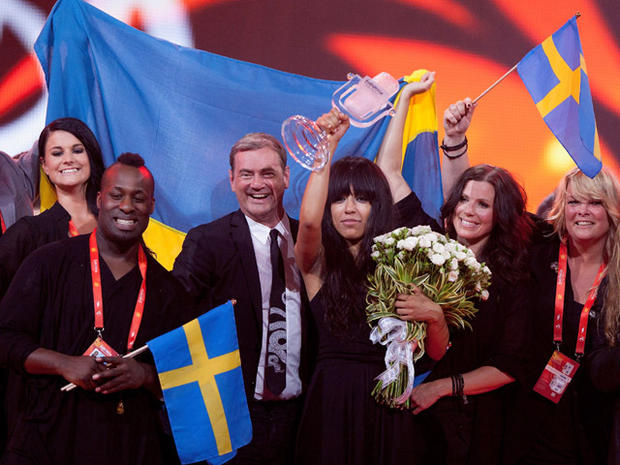Sweden's Loreen wins Eurovision song contest
(AP) BAKU, Azerbaijan - Sweden's Loreen has clinched the top spot at this year's Eurovision Song Contest with her dance hit "Euphoria," pushing aside competition from a sextet of Russian grannies and a Serbian balladeer.
Juries and television viewers from across Europe awarded Loreen a total of 372 points, handing her an easy win in an event that ended in the early hours Sunday in host country Azerbaijan. Sweden will take over hosting duties next year.
Softly spoken Loreen, a 28-year-old of Moroccan-Berber descent, thanked her fans for their support.
"I wouldn't have been able to do this without you. Thank you so much," she said after her victory was announced.
Russia's Buranovskiye Babushki garnered much public affection for their cute onstage presence, but their folksy dance ditty "Party for Everybody" couldn't quite match Sweden's more contemporary offering and ended up second on 259 points.
Zeljko Joksimovic, a Eurovision regular from Serbia, came in a distant third with his slow and stripped-down "Nije Ljubav Stvar."
The 57-year-old pan-European competition viewed by some 125 million people worldwide is hailed by its legion of devoted fans as harmless, kitschy fun that allows Europeans to forget their differences — and economic troubles — for at least one night. The winner is picked by juries and television viewers across the continent, so a broad appeal is deemed key to success.
Amid the usual jamboree of youthful exuberance — and questionable taste — a pair of elderly acts had featured among the most high-profile contenders.
The UK's black-clad veteran crooner Engelbert Humperdinck, who Scottish comedian Robert Florence acerbically remarked on Twitter looked "like an inaccurate waxwork of Johnny Cash," proved a flop, however, scoring a dismal 12 points. Only Norway's Tooji did worse, coming 26th with seven points.
The Buranovskiye Babushki offered a static stage show, but did liven up their rendition of "Party for Everybody" with some choreographed baking in an onstage oven.
Europe's more boring countries lived down to expectations with performances that were forgotten even before they were over. Slow ballads were very much the flavor of the evening, with Estonia arguably achieving new depths of bland.
Past the half-way mark, Romania's six-piece Mandinga mercifully livened up proceedings with a pounding musical potpourri of bagpipes and brass, extravagant wardrobe choices, and a sultry performance by lead vocalist Elena Ionescu.
Winner Loreen went for the windswept look as she battled a wind machine to belt out the club music-lite hit "Euphoria" and assay some vaguely robotic dance moves.
Once the competitive section of the show was over, Emin, the pop star son-in-law of Azerbaijan's authoritarian President Ilham Aliyev, was winched down onto the stage to perform his own song.
Emin's inclusion in the night's entertainment roster raised eyebrows and refreshed claims of the rampant nepotism that is widely said to benefit members of Aliyev's family.
Azerbaijan, a comparatively little-known former Soviet republic, dug deep to make sure it took full advantage of its rare moment in the world limelight.
The new Crystal Hall concert venue, a light-bathed arena on a point jutting out into the Caspian Sea, cost $134 million to build and was put up in a speedy eight months. Countless more millions have been spent embellishing the capital, Baku, and buying a huge fleet of brand new London-style taxis.
Such profligacy has aroused concerns about the spiraling costs involved in holding the contest in times of austerity.
"At the moment, if the costs are growing more and more every year and it needs to be more splendid, there are countries that would have huge difficulties, especially with financial situation in Europe at the moment, in organizing it," said Annika Nyberg Frankenhauser, media department for the European Broadcasting Union, under whose auspices Eurovision is held.
Rain fell hard throughout the night in Baku, although diehard Eurovision fans were not deterred, and stuck it out on the windswept seafront promenade to cheer along their contestant in front of the big mega-screen provided.
Amid the glitz, antigovernment activists have held a number of protests in the week running up to the final, seizing on the opportunity of the increased international media presence to draw attention to what they describe as the government's authoritarian style of rule.
On Friday, police quickly shut down a small flash mob near the competition venue, roughly dragging away dozens of demonstrators and stuffing them into waiting buses, at least of one which bore a Eurovision logo.
Three demonstration participants were sentenced to jail terms of five and six days on Saturday, while 17 others were fined 20-25 manat ($25-32).
